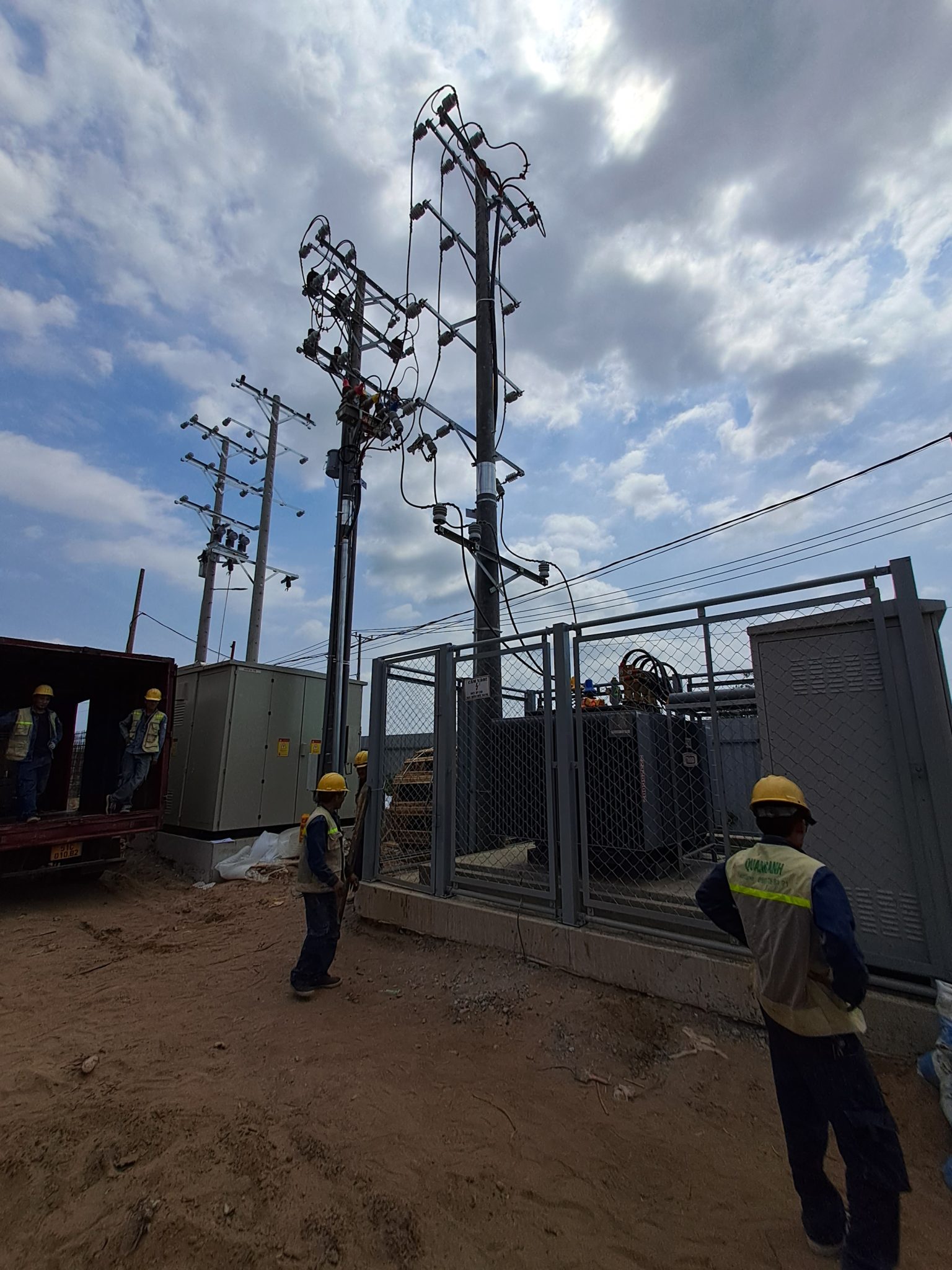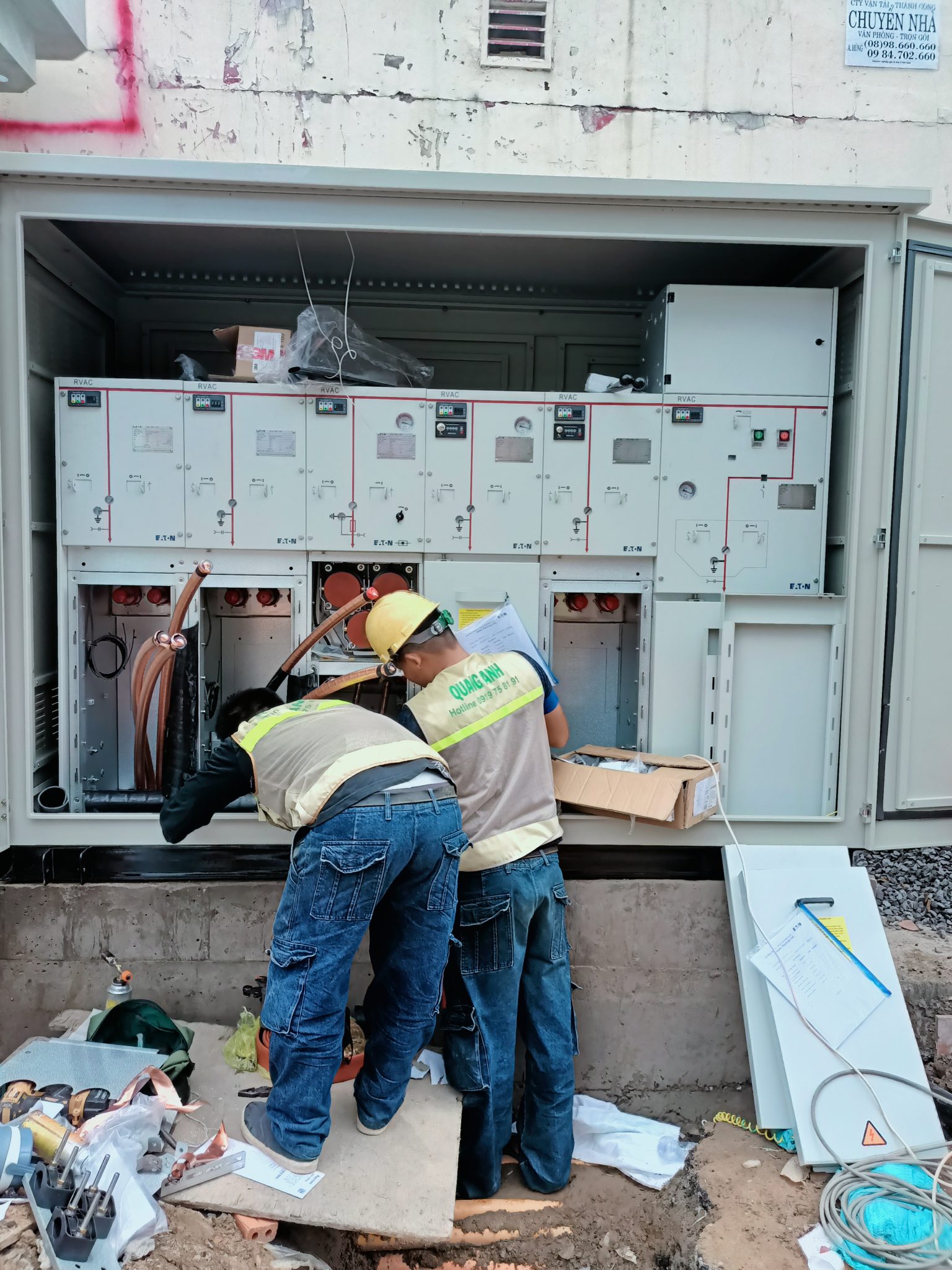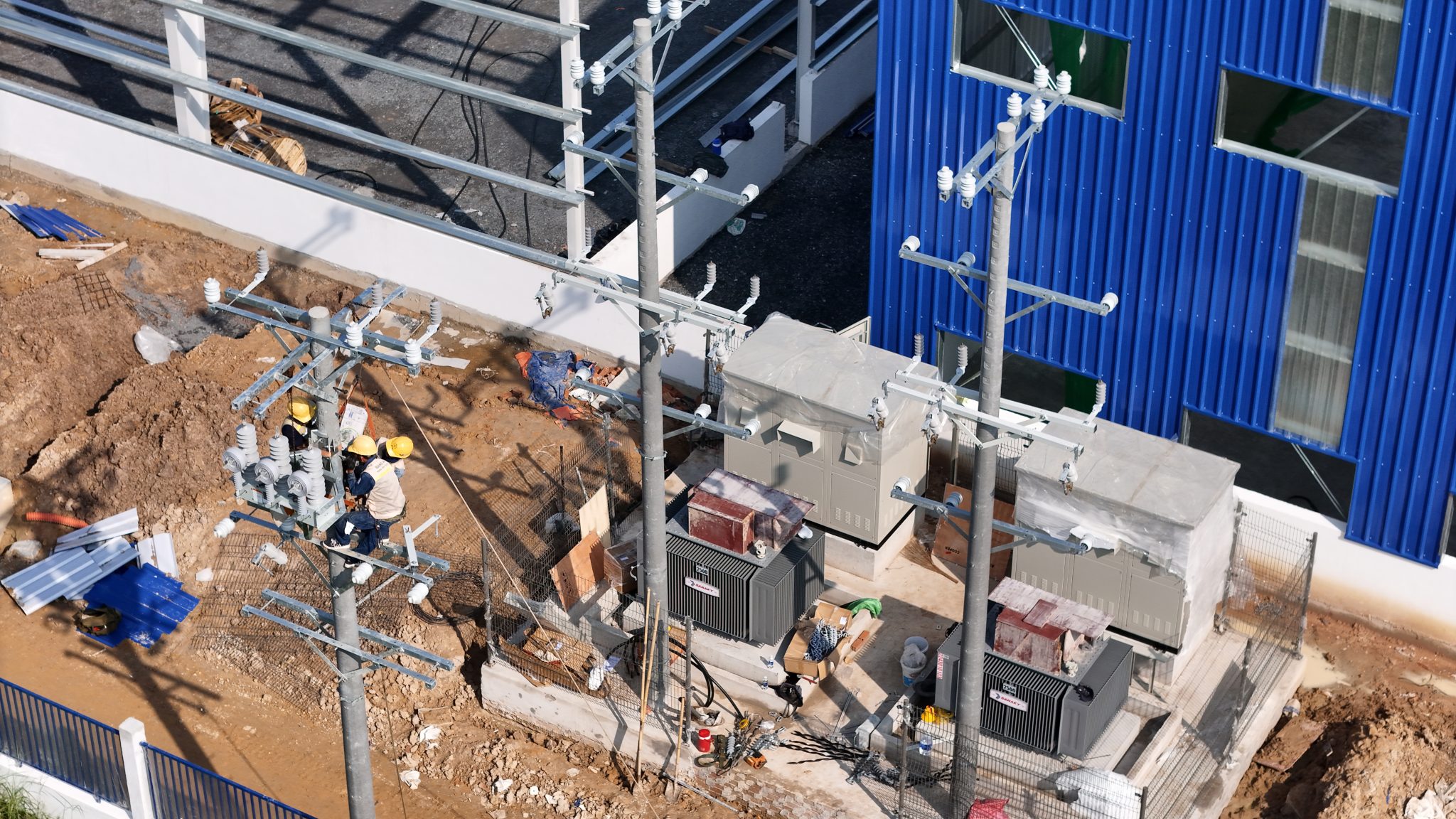The DC 180kW fast charging station is designed for electric vehicles, utilizing direct current with an output power of 180 kilowatts to ensure quick and efficient charging.
Technical Specifications of the DC 180kW Charging Station
This charging station offers an impressive output power of up to 180kW and a maximum output current of 200A. The input voltage is typically AC 380V ± 20%, while the output voltage ranges from 200V to 1000V or 150V to 1000V. It supports multiple charging standards such as CCS, CHAdeMO, and GB/T, with a NACS option available, accommodating a variety of electric vehicles.
As one of the advanced solutions for rapid charging, the DC 180kW station provides high efficiency in energy delivery for vehicles with an output capacity reaching 180 kW. Its fast charging capabilities and an efficiency rate of up to 95% meet the diverse needs of modern transportation.
The input voltage is set at 380V AC ±20% to ensure stable operation, a significant advantage when selecting a charging station for industrial electric systems requiring flexibility and high reliability. The wide output voltage range, from 200 to 1000 V DC, supports a broad spectrum of electric vehicles, from common models to those with higher energy demands.
A standout feature of the DC 180kW station is its compatibility with a wide range of popular charging standards like CCS (Combo), CHAdeMO, GBT, and SAE J1772. This ensures the station can accommodate various electric vehicle models, maximizing charging potential and expanding the customer base.
The station’s compact design, approximately 1600 x 750 x 550 mm, allows for easy installation in various locations, whether floor-mounted or wall-mounted, highlighting flexibility in deployment at public or commercial sites.
This station is equipped with three charging guns, each providing an output current from 0 to 200 A, enabling simultaneous charging of multiple vehicles. The 5-meter charging cable offers convenience for vehicles parked at various distances.
With an efficiency of 95% or higher, the station conserves energy and minimizes heat output, ensuring safe operation. Safety standards and certifications, such as CE, FCC, and RoHS, further reinforce the system’s reliability and quality.
Regarding communication, the DC 180kW charging station supports the Open Charge Point Protocol (OCPP) version 1.6 and 2.0. This open protocol allows integration with charging station management systems and remote monitoring, offering operators optimal convenience and management capabilities.
The dynamic load distribution feature allows for efficient energy management, coupled with precise protection to ensure the station’s longevity and safety throughout its operation. Designed with user convenience in mind, this station promises a friendly and easy-to-use solution for all customers.

Features and Performance of DC Fast Charging
The 180kW DC fast charging station can recharge each vehicle in just 15-30 minutes and can charge two vehicles at once. It boasts high energy conversion efficiency of ≥94% and has minimal standby power consumption. Some models feature liquid cooling, enhancing performance and durability during continuous high-power operation.
DC fast charging, also known as Direct Current fast charging, is an advanced technology that uses direct current to charge electric vehicles (EVs) and large-battery devices. This significantly accelerates charging compared to traditional alternating current (AC) methods.
A key advantage of DC fast charging is its ability to deliver current directly to the battery, bypassing the vehicle’s onboard converter. This eliminates internal converter efficiency limits and optimizes charging time. With Level 3 EV charging technology, DC fast charge outputs can range from 50 kW to several hundred kW, depending on the equipment, significantly reducing charging time.
DC fast charging performance is truly remarkable. For many EVs, this technology can charge up to 80% of the battery in just 30 minutes to an hour, compared to hours with AC charging. This is invaluable for long-distance travel where minimal charging stops are necessary.
However, charging speed depends on the battery capacity and the public charging station’s output capability. Each vehicle may charge faster or slower depending on these factors. AC fast charging only supports a maximum output of around 43 kW, thus cannot compete with DC fast charging for reduced times.
Additionally, DC fast charging stations are widely available at parking lots and rest areas, meeting the demand for quick and efficient energy replenishment. Other related technologies such as Power Delivery are used for speeding up the charging of small electronics, but the high power of DC is the main factor accelerating EV charging.

Benefits and Compatibility of the Charging Station
The 180kW DC fast charging station supports a variety of charging standards and boasts broad compatibility. It offers a user-friendly touchscreen interface along with flexible payment options via mobile apps, RFID cards, or credit cards, and supports OCPP 1.6J and 2.0 protocols, ensuring safe and efficient station management.
Electric vehicle charging stations offer numerous benefits not just environmentally but also economically and socially. By using these stations, we can help reduce greenhouse gas emissions and improve air quality, contributing to a sustainable future. These stations promote EV usage, lessen dependence on fossil fuels, and encourage renewable energy adoption.
Economically, EV charging stations create revenue opportunities for businesses. When customers charge their EVs, they tend to stay longer, providing businesses with chances to sell additional services or products. Moreover, with a well-planned business model, a charging station can be an additional income stream through direct electricity selling to users.
Socially, the development of EV charging stations significantly enhances clean transportation infrastructure, providing convenience and reliability for EV users. This not only expands the travel range for EVs but also supports energy accessibility in urban areas.
Compatibility of EV charging stations is another crucial factor. These stations are designed to support a variety of electric vehicles and different levels of charging, from low-power home charging to advanced rapid public charging. This is achieved through popular charging interfaces like CHAdeMO, CCS, and Type 2, ensuring compatibility with many EV models and reducing incompatibility concerns. The ability to integrate control and automated payment technologies through modern applications, such as the OCPP protocol, alongside flexible payment methods from mobile apps to credit cards, enhances user experience and efficient management.

The DC 180kW fast charging station offers various technical advantages like rapid charging technology, security protocols like OCPP, and supports a wide range of electric vehicles. It represents a strategic investment to meet the demands of the modern electric vehicle market.
Contact QuangAnhcons for consultation and installation of the DC 180kW fast charging station: Hotline +84 9 1975 8191
QuangAnhcons offers DC 180kW fast charging station solutions with advanced technological utilities and diverse installation support.
[contact-form-7 id="7239967" title="Contact form 1"]


Related Posts
Tay Ninh Solar Power Planning: Technical Framework, Grid Interconnection, and Rollout Roadmap
Technical overview of solar planning in Tay Ninh: irradiation, grid capacity, permitting, design, operations, and [...]
Dec
Binh Duong Solar Planning: Regulatory Framework, Grid Interconnection, and an Implementation Roadmap for Factories and Industrial Parks
An overview of Binh Duong solar planning: legal framework, interconnection, design, risk management, and an [...]
Dec
Solar Farm Repair: O&M Workflow, IV Curve Diagnostics, Thermography, Inverter Service and Utility-Scale Safety
A utility-scale solar farm repair plan centered on O&M, IV curves, thermal imaging, inverter service, [...]
Dec
Dong Nai Solar Power Plan 2023–2025: Tri An 1,029 MW, Grid Upgrades and the DPPA Pathway
A complete look at Dong Nai’s solar power plan: Tri An 1,029 MW, irradiation potential, [...]
Nov
Quang Ngai Solar Power Plan 2024–2030: Legal Framework, Irradiance Potential, and Development Roadmap
A complete look at Quang Ngai’s solar power plan: capacity targets, irradiance (PVout), development zones, [...]
Nov
Solar Damage Assessment Services: On-Site Procedures, EL/IV/Thermography Testing & Compliance with Standards
Discover IEC/UL/NEC standard solar damage assessment processes: on-site evaluation, EL and IV curve testing, thermal [...]
Nov
Comprehensive Package Estimate for a 1800MVA 500kV Substation: Scope, Configuration 3x600MVA, Standards and Timeline Management
An overview of the 1800MVA 500kV substation estimate: construction scope, configuration 3x600MVA, GIS/AIS, SCADA, standards, [...]
Nov
Factory Electrical Systems: Comprehensive Design and Implementation Guide
Discover the detailed and safe process of factory electrical systems design and implementation. [...]
Oct
Blueprints Required for Factory Construction Permits
Discover the necessary blueprints in factory construction permit applications, from floor plans to electrical and [...]
Oct
What Are the Requirements for a Factory Construction Permit? A Comprehensive Guide
Explore the documentation and steps needed to secure a factory construction permit for streamlined project [...]
Oct
Factory Construction Permit Procedures in Vietnam: Essential Guidelines and Documents
Learn the procedures for securing a factory construction permit in Vietnam, focusing on document preparation [...]
Oct
Key Steps in the Factory Construction Process
Discover the essential steps and requirements for building factories. [...]
Oct
Comprehensive Electrical Substation Solutions by Quanganhcons
Discover the cutting-edge electrical substation solutions offered by Quanganhcons for industrial applications. [...]
Oct
Investment Costs for a 1MWp Solar Power System and Influencing Factors
Explore the investment costs for a 1MWp solar power system in Vietnam and the influencing [...]
Sep
QuangAnhcons: Elevating Wind Energy Solutions
Explore QuangAnhcons' leadership in wind energy and renewable solutions in Vietnam. [...]
Sep
Electrical Contractor Strategies at Becamex Industrial Park
Discover the strategic advancements and partnerships of the electrical contractor at Becamex Industrial Park. [...]
Sep
Investment Insights for 1MW Wind Energy in Vietnam: Costs and Opportunities
Discover the detailed analysis of costs and opportunities for investing in 1MW wind energy projects [...]
Sep
Advanced Electrical Installation Solutions by QuangAnhcons
Explore advanced electrical installation solutions and modern technology with QuangAnhcons. [...]
Sep
Enhancing Industrial Electrical Services with Quanganhcons
Discover Quanganhcons' expertise in industrial electrical services, offering efficient and sustainable power systems. [...]
Sep
Comprehensive MEP Solutions by QuangAnhcons: From Design to Maintenance Excellence
Discover optimal MEP solutions with QuangAnhcons, dedicated to excellence from design through maintenance. [...]
Sep